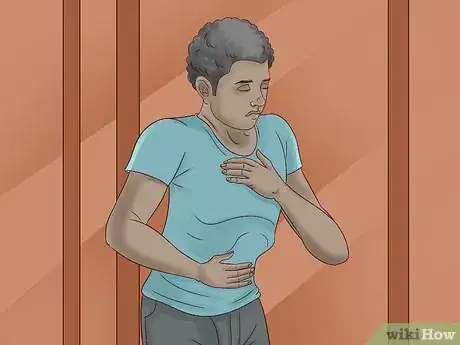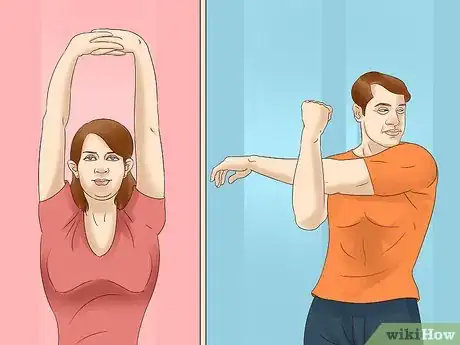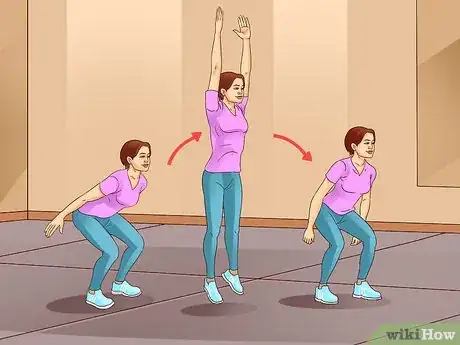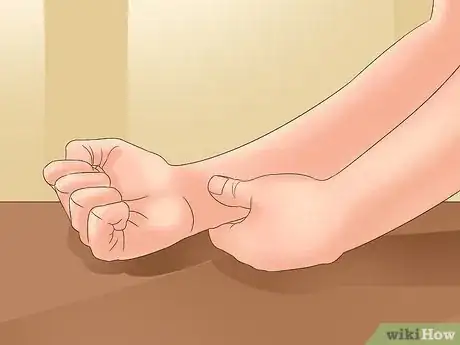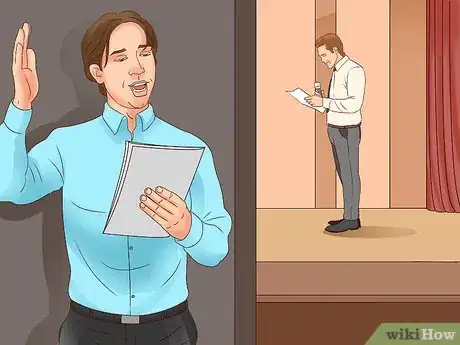X
wikiHow is a “wiki,” similar to Wikipedia, which means that many of our articles are co-written by multiple authors. To create this article, 10 people, some anonymous, worked to edit and improve it over time.
This article has been viewed 13,600 times.
If an actor claims he's never felt stage nerves, he's probably lying. Anxiety before a performance is completely natural, and any mentors worth their salt can give you advice on handling it. Here's a collection of ways to regain control, from well-known breathing exercises to a couple more obscure tricks.
Steps
Part 1
Part 1 of 2:
Performing Relaxation Exercises
-
1Breathe from your diaphragm. Breathing clears your mind and sends oxygen flowing to your brain. Stand up straight and take deep breaths from low down in your abdomen. Breathe in for a slow count to seven, then breathe out for eleven counts. Repeat this slow, rhythmic pattern until you lose the jittery feeling.[1]
- Lying down for this exercise can help you relax, but remain standing if you feel nauseous.
-
2Perform a series of stretches. This will loosen your muscles, causing you to feel a little more calm.
-
3Jump or dance in place. Some actors love to get their body moving before they go on stage or get in front of a camera. If you're mired in your own thoughts, a little exercise can be a great distraction. Go to a private location and shake out all that nervous energy.
- If you're about to perform, don't do anything that will make you breathe heavily.
-
4Massage yourself to prevent nausea. Many anxiety sufferers swear by acupressure techniques. Gently pressing the underside of your wrist is supposed to be particularly useful for soothing an upset stomach.
-
5Hold a power pose. It may sound silly, but multiple studies report an increase in confidence after a big, powerful pose. For example, place your legs apart, your arms akimbo, and hold your head up. Strike this pose in a mirror and tell yourself "I got this!" to really drive it home.[2]
-
6Warm up with tongue twisters. Get your mouth limber and your voice practiced with a few quick exercises. Try repeating "the big black bug bled black blood" until you can say it quickly while enunciating perfectly. Lip trills can help as well.[3]
- If you're in a singing performance, warm up with additional voice exercises.
-
7Wait in the calmest place you can find. Yes, you do need to stay within hearing range of the stage. That doesn't mean you need to be in a group of other nervous actors. Stand to the side and stay aware of your surroundings without getting tangled in other people's energy.
-
8Snap your fingers in front of your face. Thirty seconds before you go on, take deep breaths and snap your fingers while moving your hand in a circle in front of your face. Perhaps it's just the moment of distraction from your thoughts, but this certainly helps some people focus.
Part 2
Part 2 of 2:
Reducing Anxiety
-
1Practice as much as you can. The more your prepare by memorizing and practicing your script, the easier it will be to overcome anxiety. Practice on a real stage whenever you can, so it doesn't feel as strange on the big day.[4]
-
2Hydrate yourself gradually. Sweating and panicking can lead to dehydration, which may throw you off your game. Water will keep you refreshed and prepared, but don't gulp it down. Drink a small cup and wait for your stomach to settle before you pour yourself another.[5]
- Drinking warm (non-caffeinated) tea can feel particularly nice on your throat after singing or using your stage voice. Stash a mug backstage if you can.
-
3Follow the script backstage. While you're waiting for your scene, read along to the performance with a copy of the script. This gives you something to do and makes your move onstage feel less abrupt.
- It can be more difficult to remember your lines under pressure. Even a well-prepared actor can use a script to look through before she performs.
-
4Don't sweat small mistakes. No one delivers the perfect performance every time. New actors worry over minor slip ups much more than the audience does. If you skip a line or fumble an interaction, try to stay calm and get back on track as though it never happened. Remember, the audience doesn't know the script, and will enjoy the performance as long as you stay natural.[6]
Warnings
- Caffeine can worsen nerves and strain your vocal cords. Avoid coffee, tea, soda, and chocolate for at least a couple hours before the show.⧼thumbs_response⧽
References
- ↑ https://www.health.harvard.edu/mind-and-mood/relaxation-techniques-breath-control-helps-quell-errant-stress-response
- ↑ https://blog.ted.com/10-examples-of-how-power-posing-can-work-to-boost-your-confidence/
- ↑ https://www.voiceoverxtra.com/article.htm?id=PHKATGJR
- ↑ https://www.jenniferhennings.com/jennifer-hennings-blog/how-to-reduce-your-speech-anxiety
- ↑ https://www.inc.com/larry-kim/15-power-up-tips-to-make-you-a-better-presenter.html
- ↑ https://www.mtc.com.au/discover-more/mtc-now/what-do-actors-do-when-they-forget-their-lines/
